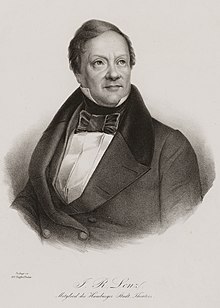Johann Reinhold von Lenz
Johann Reinhold Lenz , alias Kühne (born November 14, jul. / 25. November 1778 greg. In Parnu , Estonia ; † February 7 jul. / 19th February 1854 greg. In Riga ) was a Baltic German actor and poet .
Life
Johann Reinhold von Lenz was a grandson of the clergyman Christian David Lenz and a nephew of the poet Jakob Michael Reinhold Lenz . He attended the Lyceum in Riga and the Collegium Fridericianum in Königsberg in Prussia. At the age of 16 he joined the Imperial Russian Guard and in 1795 became a lieutenant in the Chevalier Guard, from which he resigned the following year soon after the death of Catherine II . He then acted as secretary to the influential Russian statesman Jacob Johann Graf von Sievers . When the latter withdrew from public life, Lenz moved to the stage in September 1801 in Saint Petersburg under the stage name Kühne because of his inclination to act . The first role he played was that of Ferdinand in Schiller's Cabal and Love . He devoted himself in particular to the hero subject and was widely acclaimed. In 1803 he left Saint Petersburg and wanted to continue his education at Iffland in Berlin ; but in Königsberg, where he was a guest in January 1804, he fell in love with his celebrated colleague Louise Cassini and married her on July 4, 1805.
After the fire in the Königsberg Theater in 1808, Lenz met Iffland in Berlin, who, as he had hoped, could not employ him. Guesting in Braunschweig , Lübeck and other cities with great success, Lenz and his famous wife were won over to Hamburg in 1809 after successful performances . The shaky health of his wife caused him to leave Hamburg in 1811, to the chagrin of Friedrich Ludwig Schröder . Only in Breslau did Lenz conclude a three-year contract in 1812. Here, too, he distinguished himself, gained a high degree of public favor, but returned to Hamburg in 1814, following a promise made to Schröder, after many successful guest performances in Leipzig , Mannheim , Karlsruhe and other cities, where he was artistic director until 1844 of the city theater worked.
When his wife died in 1815, Lenz became closer to Schröder, who called him his best pupil, because in Schröder's opinion an actor should also be a poet in order to achieve perfection. Schröder therefore approved of Lenz's poetic occupation, which initially consisted of translations and adaptations, but later also in numerous independent theater and pleasure pieces. After Schröder's death (1816), Lenz was the most celebrated actor on the Hamburg stage until his departure in 1844; he was in roles that required representation, "inimitable" in Schröder's judgment. His comedies in particular are mostly happy works and were often performed to great acclaim in his day.
In 1823 Lenz abandoned the stage name Kühne again. In December of that year he married Louise, b. Fleck, who passed away the next year. In his third marriage, he married the actress Caroline Amalie Schäfer on November 25, 1827 in Hamburg, from whom he divorced again in 1844.
Ludwig Tieck , who got to know Lenz in the last period of his effectiveness, explained that Lenz still completely possessed the representation style of that real German school of Schröder. Lenz's versatility, however, consisted in the fact that he portrayed comic roles just as admirably as tragic ones. During his 30 years at the Hamburg stage, Lenz also occasionally undertook art tours through Germany, made frequent guest appearances in Riga and Saint Petersburg and was celebrated everywhere as a first-rate actor.
In April 1844 Lenz took leave of the stage in Hamburg forever in the role of the carpenter Klarenbach in Ifflands Die Advokaten , as he was suffering from an eye disease. He was retired for life and went to live with his siblings in Riga, where he was at the forefront of the city's intellectual life with Conradin Kreutzer and JJ Schrameck. Lenz died there on February 7th July. / February 19, 1854 greg. at the age of 75.
literature
- P. Th. Falck: Lenz (Johann Reinhold von) , in: Johann Samuelansch , Johann Gottfried Gruber (Hrsg.): Allgemeine Encyclopädie der Wissenschaften und Künste , 2nd section, 43rd part (1889), p. 91f.
- Joseph Girgensohn: Lenz, Reinhold von . In: Allgemeine Deutsche Biographie (ADB). Volume 18, Duncker & Humblot, Leipzig 1883, p. 277.
- Carola L. Gottzmann , Petra Hörner: Lexicon of the German-language literature of the Baltic States and St. Petersburg . De Gruyter, Berlin 2007, ISBN 978-3-11-019338-1 , p. 834-835 .
Web links
- Baltic Historical Commission (ed.): Entry on Johann Reinhold von Lenz. In: BBLD - Baltic Biographical Lexicon digital
| personal data | |
|---|---|
| SURNAME | Lenz, Johann Reinhold von |
| BRIEF DESCRIPTION | German-Baltic actor and poet |
| DATE OF BIRTH | November 25, 1778 |
| PLACE OF BIRTH | Pernau , Estonia |
| DATE OF DEATH | February 19, 1854 |
| Place of death | Riga |
